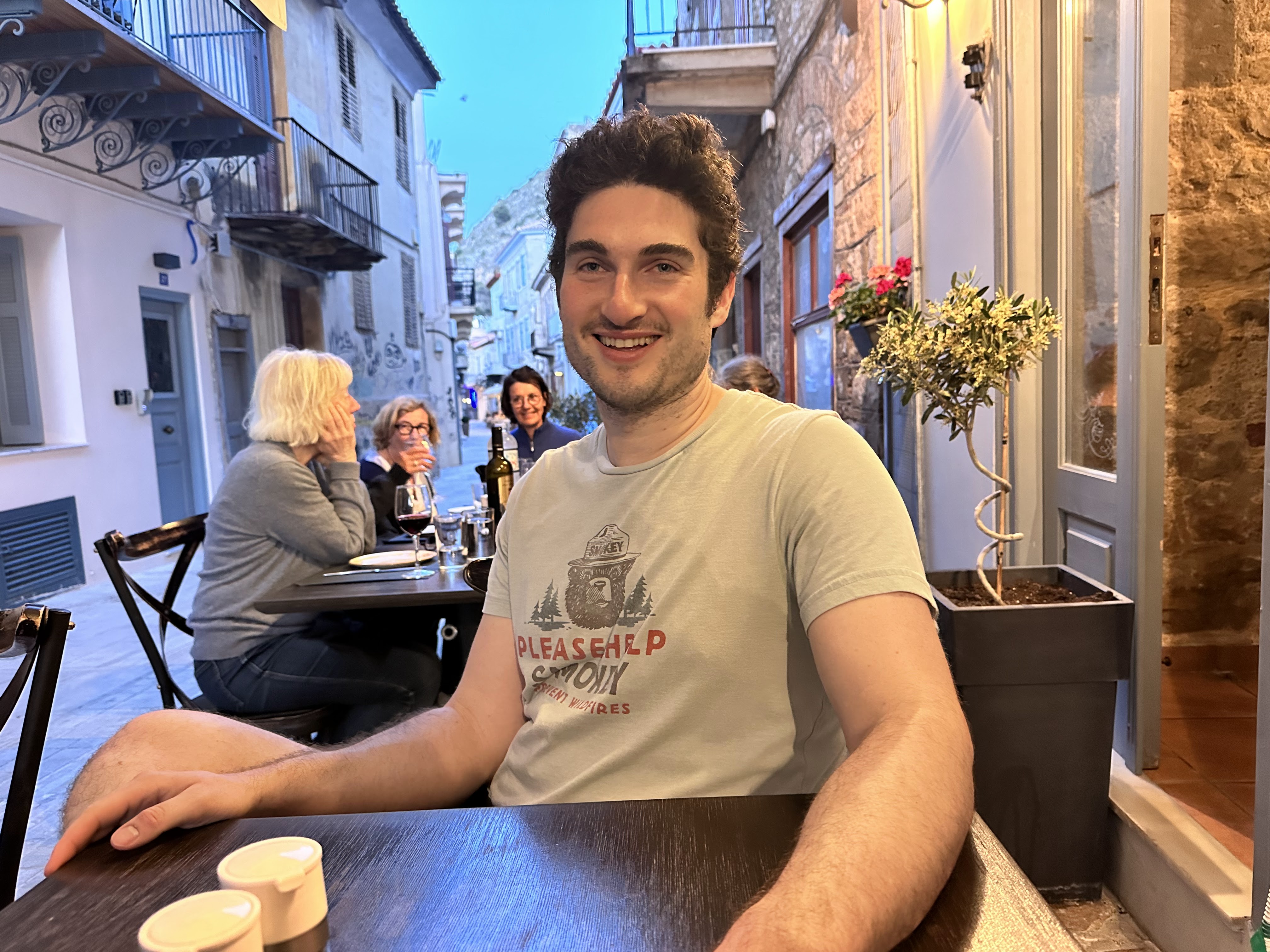In the morning we went swimming again. We swam a little further than the evening before. In the light of the morning we could see many fish swimming among the rocks. The water was a little rough. We swam north along the shore towards the rocky public beaches. The bottom was very uneven with rocky hills. I had to look down so I could make sure I wouldn’t hit one of the rocks with my hand as I pulled through the stroke. We made it most of the way to the first beach. I think Lizy swallowed some water or something and got a little nervous, so I stood on a rock and tried to support her so she could rest. The waves pulled us to and from, as I struggled to remain standing on the rock. Then we swam back.
We sat by the pool after swimming to catch our breath. An old Jewish man that Lizy had met the day before was sitting by the pool as well. He was an English professor from New York. His name was Carl. Carl tol us how he loved Greece. He used to come twice a year, but now the flight was tough on his body, so he came once a year. He was 85.
He said he always stayed at Hotel Liakoto now because his wife liked the hotel. His wife loved Greece too, but there were different levels of love. There was love and then there was love. To get her to keep coming back he needed the nice hotel. And she loved sitting by the pool.
He liked the hotel too. The owners were incredibly nice people, and they knew how to hire good staff. And the staff stayed around. There was almost no churn. At most hotels it’s a conveyor belt of barely checked in zombies, but since arriving he’d recognized every face from his previous years staying at the hotel.
As if on cue two of the house keepers came up from behind him, while he was talking to us. Both of them warmly hugged Carl, then they started talking in Greek. I don’t speak Greek, but it seemed they were warmly remarking how healthy they all looked even though they were coming on in years. After they walked away Carl kept telling us about Kardamili.
He loved Kardamili. He told us there’s a reason Patrick Leigh Fermor decided to live here once he couldn’t go back to Crete ( for readers that have forgotten Patrick Leigh Fermor was the author of the Mani travel book I had read). Patrick had killed one of his Cretan comrades while stationed there in the British army during World War 2. No one made a fuss of it during the war, since it was war, but after Germany’s defeat the killed man’s family put a vendetta on Fermor. A vendetta is an oath to kill a man. According to Carl, they’re very popular on Crete. That’s why Fermor ended up building a house on the mainland in Kardamili. The vendetta was eventually settled, allowing Fermor to go back to Crete. He was very old by then though. Still it’s good that it was eventually resolved.
I’m going to interject Carl’s remarks here to say a little about Fermor’s house. The house is just outside on a hill overlooking the water. One used to be able to go on tours of the house, but now the organization that owns the house is trying to use it mostly as a high end rental, so we were unsure if there were still tours. It’s probably most famous to a North American audience because of the movie Before Midnight which used the house as one of the main settings of the movie. The movie was the reason I had heard of Kardamili when I was originally booking the trip and why it seemed like a nice place to stay for a honeymoon.
Carl had his own thoughts on Fermor. He wasn’t a huge fan of him after reading his biography, which he recommended to me. He said that he had worked with people like that in the English department. Fermor would invite people stay with him and his wife, he’d use them, and then he’d toss them out. He had affairs, the whole thing. He was a user of people. But if you wanted to read a book on the Mani, his is the book to read.
Carl then told us how he used to go to Crete. He would go to every archeological site and turn up every cranny. He even went some places where no one was supposed to go. Then he wrote a book , and that sort of put a capstone on those days. Now he always came to Kardamili.
Afterwards we quickly packed up our room and drove to Kardamili beach to eat lunch by the water.
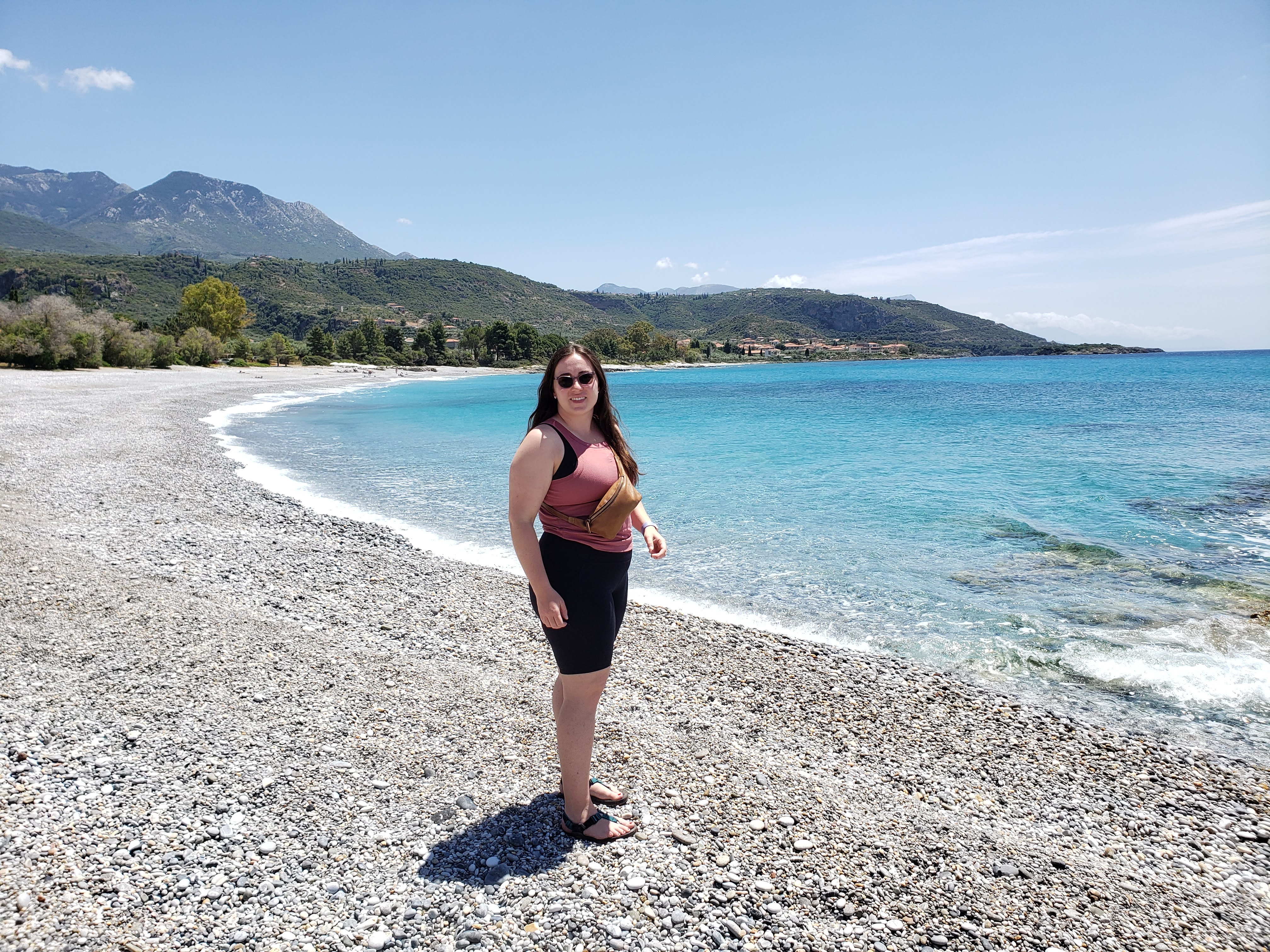
Next we set out to hike into the foothills right behind Kardamili on the slope of the Taygetos mountains. We had found the trail on a custom map printed off by our hotel. In the map the different trails were marked by flag icons. I didn’t grasp the significance of the flags until I was on the trail and noticed the trail was marked by the same flags as decorated the map. I’m not sure who organized the flag system, but it simplified path finding. A lot of the trails are the old, now unused, mule trails, that people used to take to get to the smaller villages in the mountains. Since the government has built roads for cars these old trails have been converted into hiking trails for tourists.
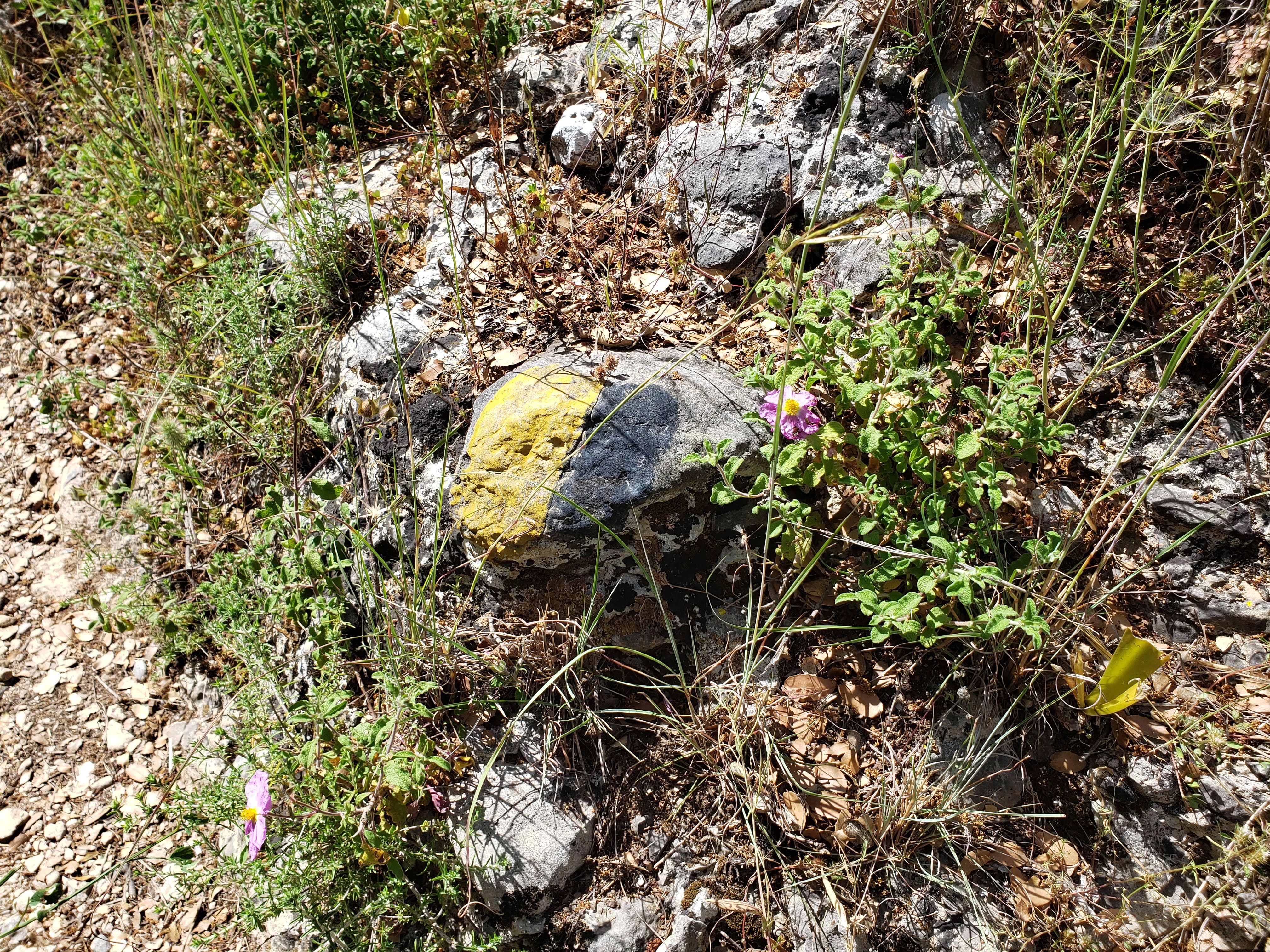
On our way into the mountain we first stopped at Old Kardamili. In Old Kardamili there still stood the fortress that defended the town up until the late 19th century. It was now in the process of being converted into a museum. In the Outer Mani towers were not built right on top of each other. Feuds within a village were not common like in the Inner Mani, instead each area was controlled by a local strongman, more similar to a traditional feudal society. The strongman would have a fortress to defend his village and it would be the single stone tower of the village.
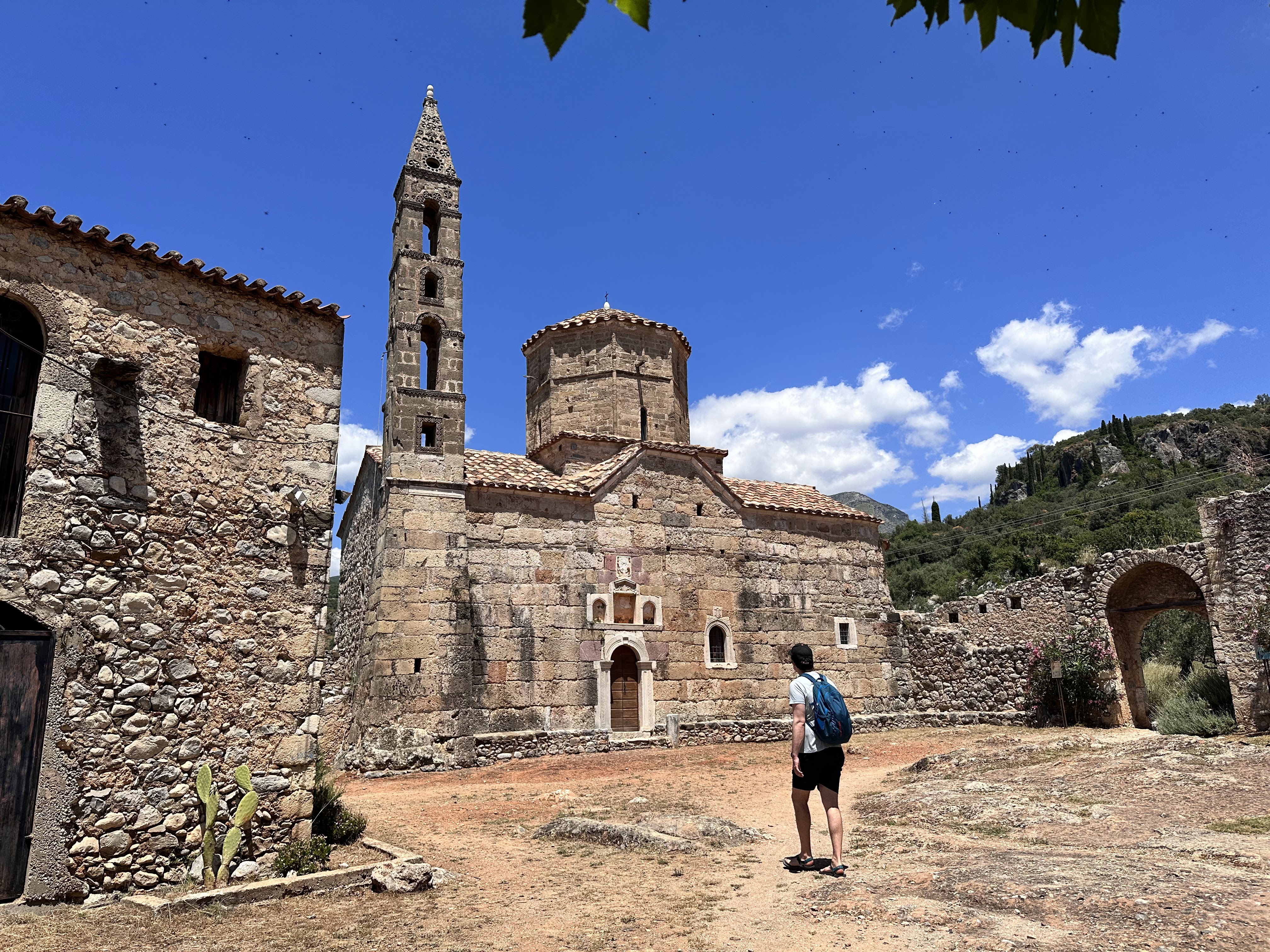
Afterwards we happened to bump into another Jewish couple from New York. We chatted with them a bit on the trail. The man especially was very chatty. He told us as story about when his landlord in Heidelberg heard him speak Yiddish. It must’ve tipped her off that he was Jewish because after that she didn’t like him. He’d traveled to a lot of places, but Germany is the only place that made him feel uncomfortable. And he went on further,
“And the Germans are sanitizing history now. The talk of how the Nazis killed the Jews. Like the Nazis were some minority in Germany that didn’t represent the German people. It was the Germans. The Germans killed my family. When the Nazis were marching Jews to the trains the Germans were not shielding their eyes, they were hailing Hitler.”
Then he talked about how his father tried to bring out as many of his relatives as he could from Europe before the war, but some of them had been established with families and decided to stay. Sometimes people can’t see the writing on the wall.
Conversation drifted to more frivolous topics. Lizy told them about the Caves of Diros, which we had visited the day before. The man’s wife said, “See we should go.” as if she often struggled to convince him to veer from his master plan. But later in the conversation I let it out we had never been in a big cave before and he said, “You see,” pointing to his wife, “You have to think about the source of any piece of advice. They’ve never seen a cave. We’ve gone to caves all over China and Vietnam.”
After we left the couple, the hike continued behind old Kardamili on a narrow trail that winded up the hill. There were many flowers. The trail was exposed to the sun and in the mid afternoon sun we both became quite hot. Even so, we made it to the top.
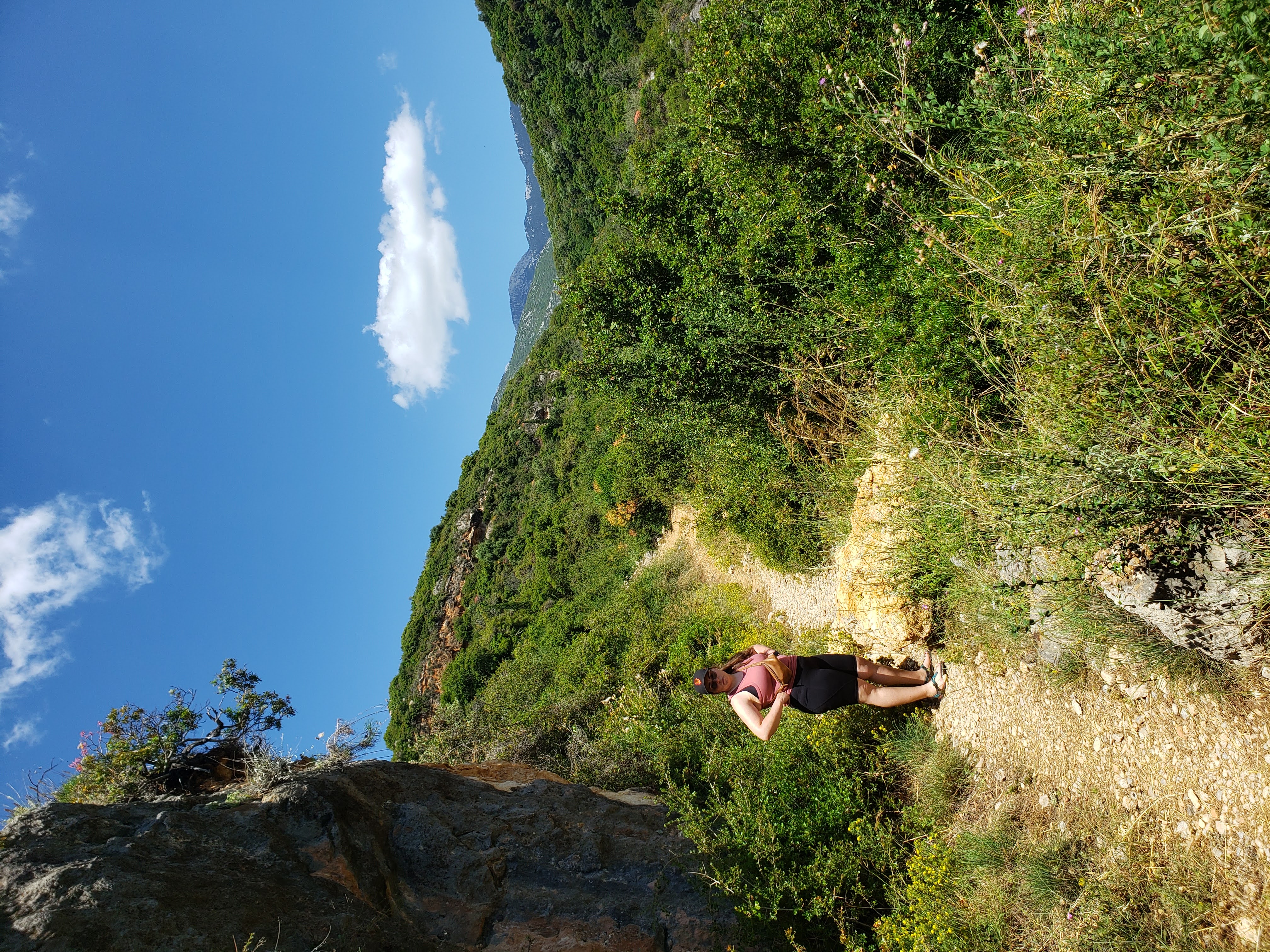
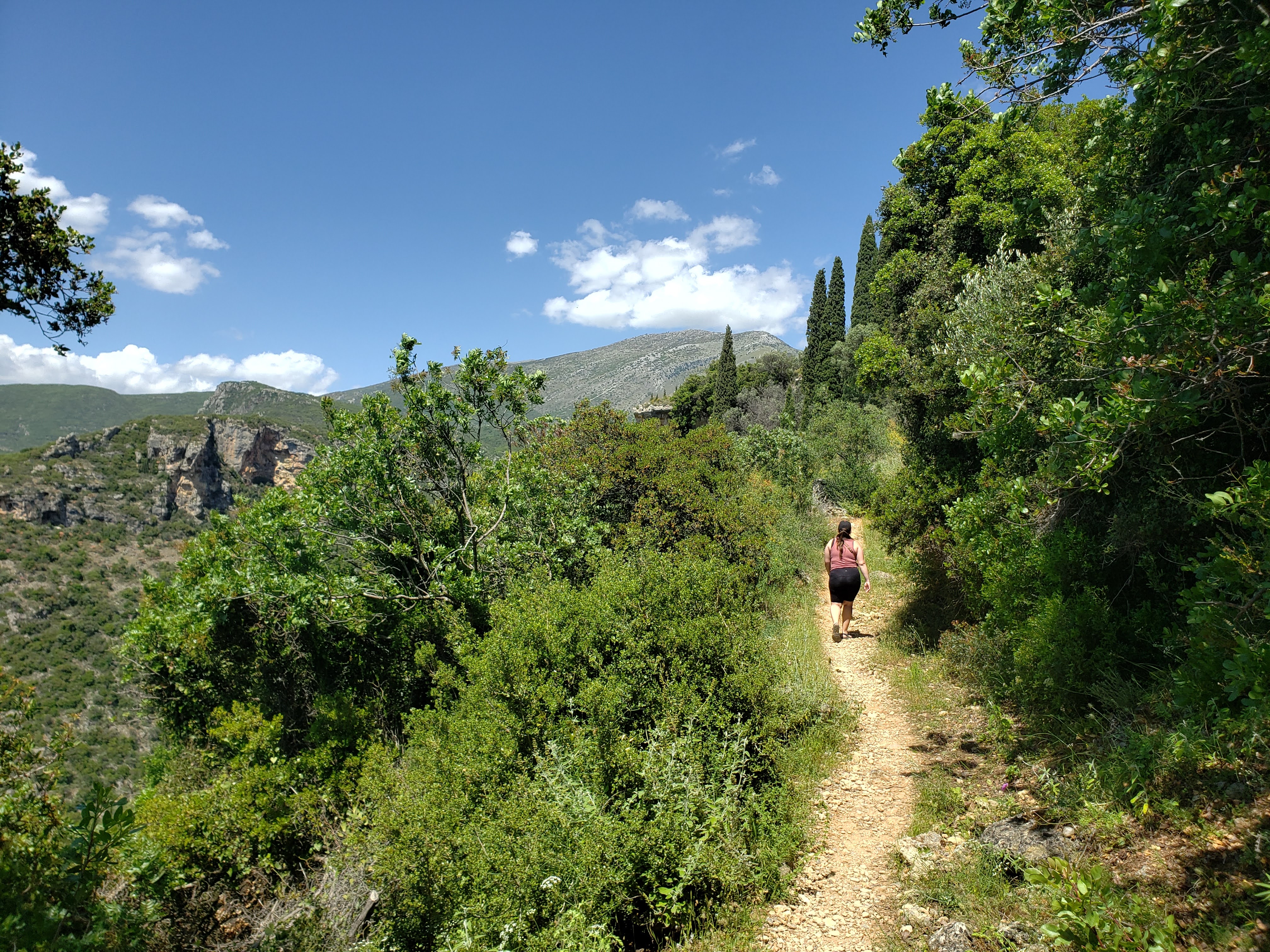
At the top of the hill there was a small church. It was called Agia Sophia and it was built in the 1600’s. We could not enter the church because it was locked, but we got some photos around the outside. Behind the church was a small village named after the church, which we didn’t walk into, and further east towered more of the Taygetos Mountains. In front of the church we could see down the hill to Kardamili on the water. To the south was a gorge separating us from another hill with another village.
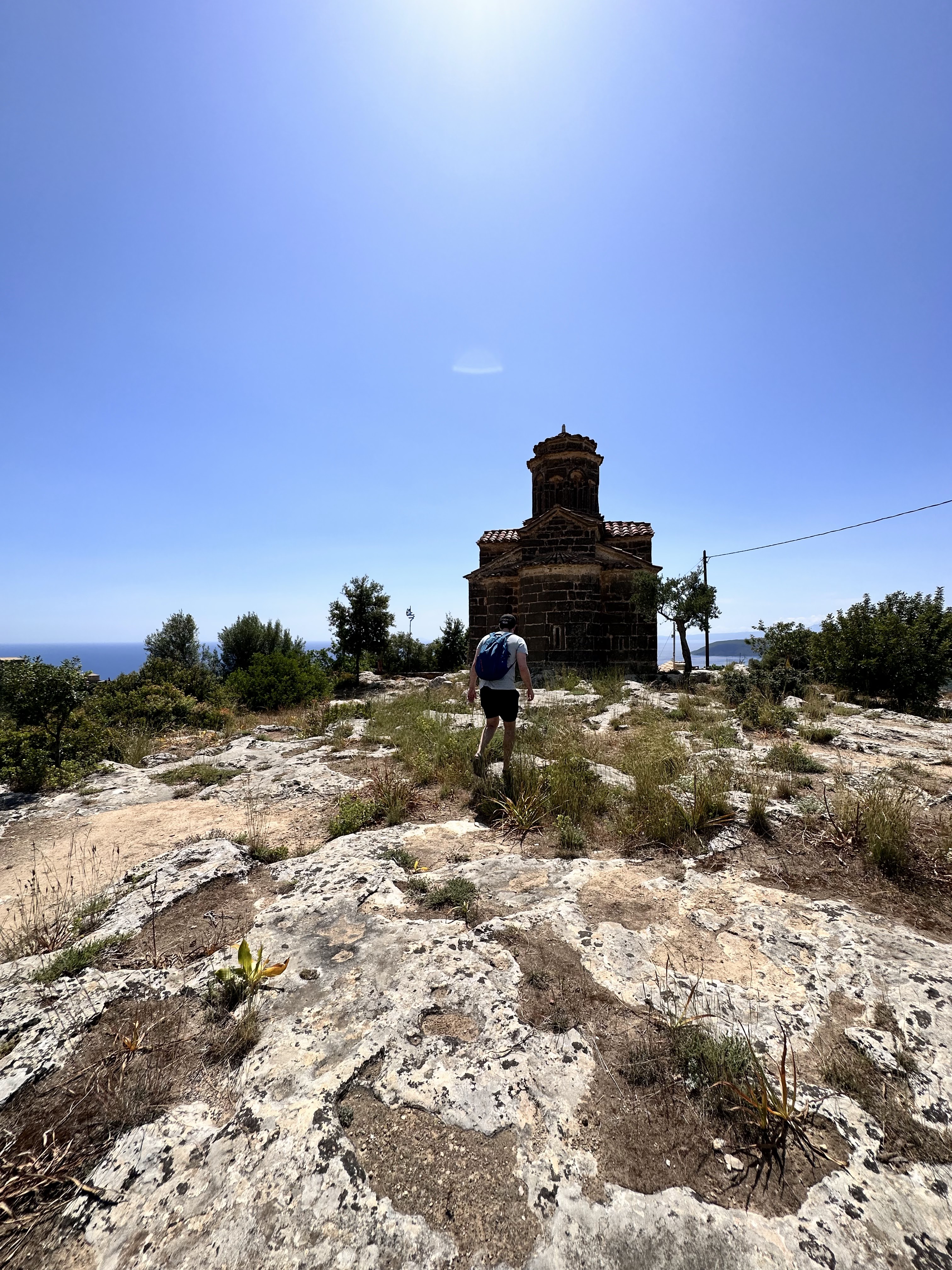
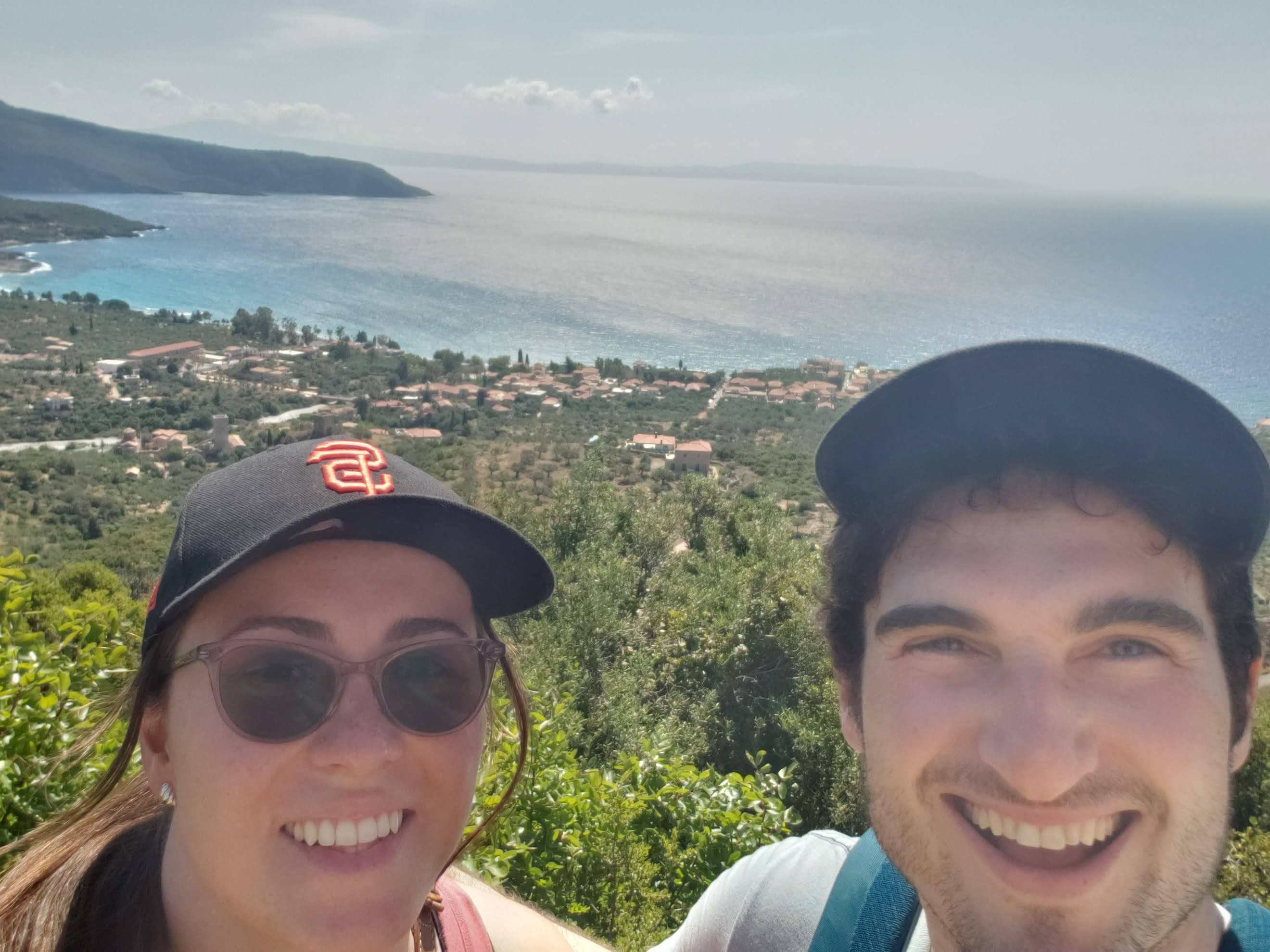
The trail winded down south into the gorge, then back up to the village on the hill that we had seen. This part of the trail was shaded, which was a welcome change. After we got up to the other side of the gorge, the trail continued down a cobblestone path that took us straight down the hill and back into Kardamili. Eventually it converged with the new road for cars.
When we finally got back to Kardamili we stopped to rest at a little ice cream parlor. We both got delicious frozen yoghurts from a grumpy old man. What I assume was his wife was working behind him in the kitchen. Odd couple. She seemed so happy and he was so grumpy.
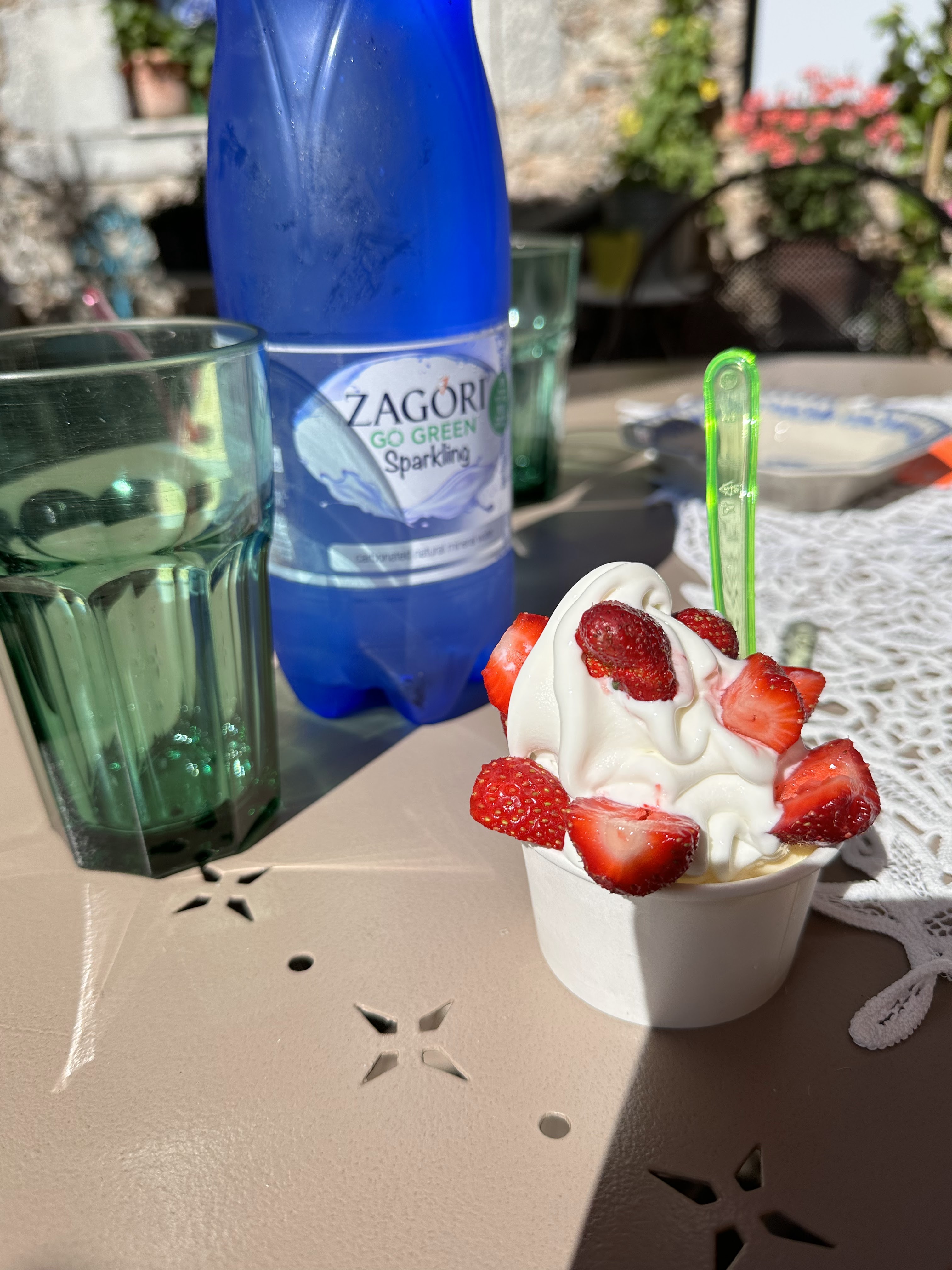
And so ended our time in Kardamili. We had to head to Nafplion before it got too late. Lizy was sad to leave Kardamili. She even started wondering if we should go back to the hotel and book a room for next year. The hotel concierge had told us earlier their patrons often did that. There were some people that stayed at the hotel that were so particular they had to stay in the exact same room from year to year, so they made sure to book ahead.
Farther into the drive Lizy started brainstorming what kind of business she could open in Kardamili. She really wanted to go back, but we had to keep going. It was easy highway driving all the way to Nafplion.
I’ll end this post with a photo of us at dinner in Nafplion.
